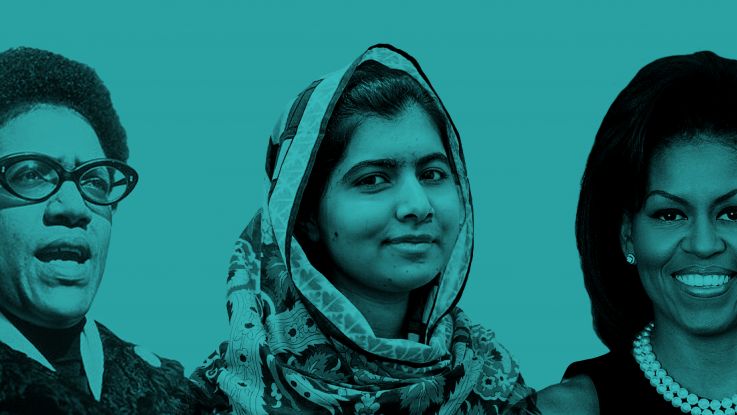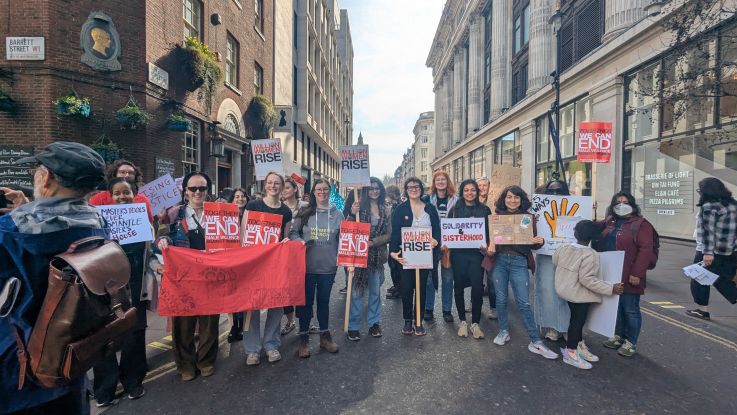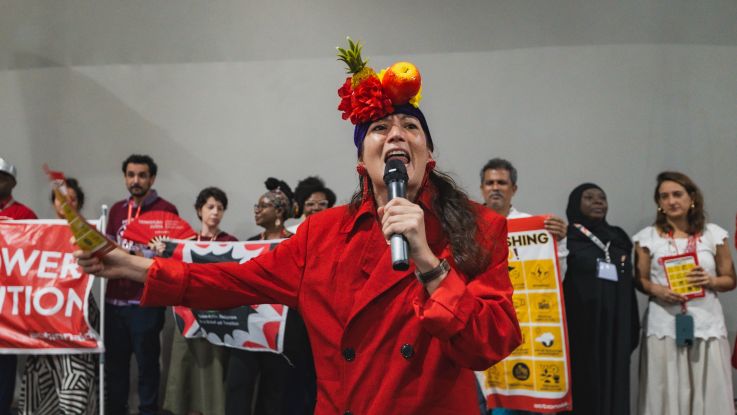16 Days of Activism: stop counting and start demanding change
21 November 2025
Every three days, a woman is killed in the UK. As the world marks 16 Days of Activism, it’s time to stop counting the losses and start demanding real change.
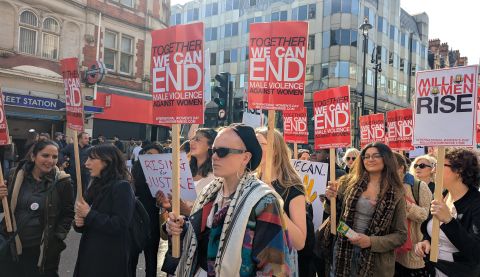
ActionAid marching for women's rights and to end gender-based violence. Photo: ActionAid
A woman is killed every three days in the UK.
Read that again. Every. Three. Days.1
That statistic, read aloud by Minister Jess Phillips in Parliament this March, isn’t just a number. It’s 122 women a year whose names we should never have had to learn this way. And that’s just here in the UK. Globally, one in three women will experience violence in her lifetime.2
As we mark the 16 Days of Activism against Gender-Based Violence (25 November – 10 December), we’re not just mourning loss and rollback on women's and girl's rights; we’re arming ourselves with evidence and we’re demanding that governments deliver on the promises they’ve already made.
Find out why violence persists, why structural violence keeps women unsafe, how government failures compound the problem, and how you can help turn awareness into action.
Why violence persists: It’s not about ‘bad men’, it’s about broken systems
Let's be honest about why we're still fighting for our rights in 2025.
Gender-based violence (GBV) doesn't exist in a vacuum. It's not just about ‘bad men’ or individual acts of cruelty. It's held up by what experts call structural violence: the invisible scaffolding of laws, policies, economic systems, and social norms that make violence against women not just possible, but predictable.
It looks like this:
- Rape crisis centres turning survivors away while the Home Office underspends its own prevention budget by 15%.
- Migrant women forced to choose between abuse and deportation because their visas depend on their abuser.
- Women in low-paid, precarious jobs who can’t afford to leave.
- Courts exposing children to violent perpetrators in custody cases.
- Austerity measures stripping away women’s services, especially those for Black, disabled, and migrant women.
- Digital platforms that profit from misogyny while failing to stop online abuse.
- Climate disasters that drive up rates of violence — yet just 0.04% of global climate funding focuses on gender equality1.
This is why violence against women persists at such alarming rates. It's systemic. It's structural. And it requires structural solutions, not just individual interventions.

"I am not free while any woman is unfree, even when her shackles are very different from my own," is a quote by the author and activist Audre Lorde, a powerful statement about the interconnectedness of all women and the importance of intersectionality.
Promises aren't progress: how the UK falls short
When it comes to solutions that tackle the systems that keep women unsafe, the UK’s record remains alarming.
In January, the National Audit Office revealed that, despite three national GBV strategies since 2010, outcomes for victims haven’t improved. Sexual assault rates are higher than in 2009. The Home Office underspent its VAWG Strategy budget by 15%. that's £22 million that could have funded services, while 14,000 survivors waited for rape crisis support. 3
One in 12 women in the UK experience gender-based violence every year, that is over a million crimes. Yet fewer than one in five victims report abuse.2
Globally, GBV services received just 29% of the funding needed in 20243That shortfall leaves 36 million displaced women and girls without access to life-saving support this year.4
This is structural violence in action, the gap between what governments promise and what they deliver.
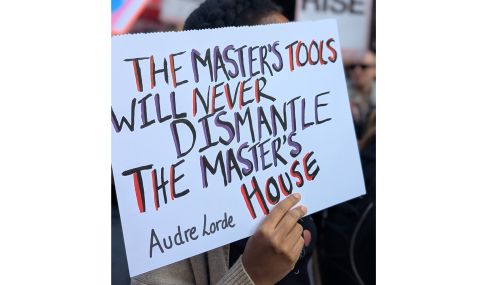
Audre Lorde's famous quote, "the master's tools will never dismantle the master's house," argues that systems of oppression, like patriarchy and white supremacy, cannot be dismantled using the very tools and tactics they were built with.
How to hold your government accountable: a toolkit
Numbers alone don’t create change. People do. Here’s how to turn awareness into action. Get involved, your testimony matters.
1. Know what your government has promised
Most governments have signed treaties that legally require them to prevent and respond to violence, like CEDAW or the Istanbul Convention. Find out what your government has ratified. Look up your national GBV strategy. Find out when your country faces its next CEDAW review5. Women's organisations submit 'shadow reports' highlighting where governments are failing.
2025 marks 30 years since the Beijing Declaration, the most progressive blueprint for women's rights ever agreed. Governments are making new commitments right now. Hold them to the Beijing+30 Action Agenda. Don't let this anniversary be all speeches and no action.
Knowledge is power, but only if you use it.
2. Demand the receipts
Governments love announcing new initiatives. Less keen on showing whether they work.
Ask where the money is going. Push for public reporting on GBV funding, prosecution rates, and access to services: broken down by gender, race, disability, and class.
3. Stop the underfunding issue
Specialist services, especially those led by and for marginalised women, are barely surviving. Demand long-term, ring-fenced funding, not short-term projects that pit women's groups against each other.
4. Use the law
If your government fails to act, international mechanisms like CEDAW allow individuals and organisations to hold them accountable. Support strategic cases that set precedent—every win shifts the balance of power.
5. Contact your MPs
Write to them, go to their surgeries, and demand they raise GBV in Parliament. Vote accordingly. Politicians respond to pressure. Be the pressure.
6. Connect the struggles
Violence doesn't exist separately from poverty, racism, climate crisis, or discrimination. Build coalitions that reflect the reality of women's lives. Structural violence affects different women differently.
7. Challenge violence when you see it
Call out discrimination at work, in your community, online. Support prevention education. Challenge the attitudes that normalise violence. Structural change requires cultural change.
Why this matters: beyond the statistics
Behind every statistic is a person. Someone who deserved safety, dignity, freedom. Someone whose potential was stolen by violence that was entirely preventable.
But none of this happens without sustained pressure from below. Governments don't act because it's right. They don't fund prevention because it's the right thing to do. They only act when the political cost of inaction becomes too high.
That's where you come in.
This 16 Days of Activism, let's honour survivors by refusing to accept 'good enough.' Let's hold governments accountable not just to their promises, but to their legal obligations under international law.
Because ending gender-based violence isn't charity. It's not a favour.
It's a human right.
And it’s long overdue.
If you or someone you know is affected by violence:
- National Domestic Abuse Helpline: 0808 2000 247 (24 hours)
- Rape Crisis England & Wales: 0808 500 2222
- Refuge: 0808 2000 247
- Respect Men’s Advice Line: 0808 8010 327
- Galop (LGBTQ+): 0800 999 5428
- In immediate danger: dial 999 (press 55 for silent calls)
Global Resources:
Footnotes
- 1
https://www.itv.com/news/2025-03-06/jess-phillips-lists-the-names-of-women-killed-by-men-in-the-last-12-months
- 1
- 2
- 2
- 3
‘Home Office historically underspends its own violence prevention budget by 15%’
National Audit Office
- 3
- 4
UNHCR Global Appeal 2025 and UN News reports, November 2024 Gender-based violence | Global Focus +2
- 5
United Nations Treaty Collection and OHCHR CEDAW documentation OHCHR

